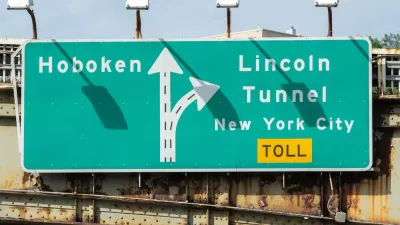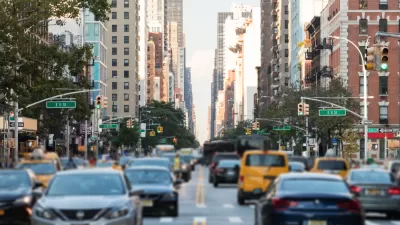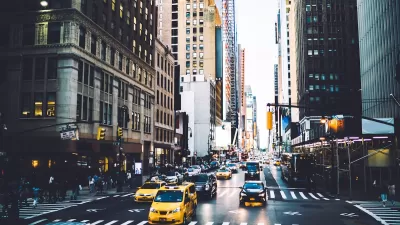How might cordon pricing impact DC drivers and transit users?

In a post in Greater Greater Washington, D. Taylor Reich outlines the results of a study on how road pricing similar to New York City’s new congestion pricing program could work in Washington, D.C.
After building a prototype software program to model changes in transportation behavior, Reich assessed the potential impact of a $5 charge on cars entering one part of the District. According to Reich’s simulation, which includes reinvesting road pricing revenue into public transit, “This particular combination of road pricing and reinvestment would make travel 10% more convenient for lower-income Washingtonians, have a negligible benefit for the average DC resident, and make travel 2% less convenient for the average resident of the greater metro area.”
The model also indicates there would be a 10 percent drop in driving in D.C. and a three percent drop in the metro area. “This reduction in car travel would bring second-order benefits in emissions, road safety, and noise pollution.”
As Reich notes, “Some people would benefit more, while others would lose out—but on the whole, reinvestment in public transportation would mean a major improvement for lower-income people, especially those in more central areas. Moreover, the reduction in car travel would bring other, indirect benefits for the environment and public health.”
FULL STORY: Road pricing could make transportation in the District more equitable

Planetizen Federal Action Tracker
A weekly monitor of how Trump’s orders and actions are impacting planners and planning in America.

San Francisco's School District Spent $105M To Build Affordable Housing for Teachers — And That's Just the Beginning
SFUSD joins a growing list of school districts using their land holdings to address housing affordability challenges faced by their own employees.

The Tiny, Adorable $7,000 Car Turning Japan Onto EVs
The single seat Mibot charges from a regular plug as quickly as an iPad, and is about half the price of an average EV.

Seattle's Plan for Adopting Driverless Cars
Equity, safety, accessibility and affordability are front of mind as the city prepares for robotaxis and other autonomous vehicles.

As Trump Phases Out FEMA, Is It Time to Flee the Floodplains?
With less federal funding available for disaster relief efforts, the need to relocate at-risk communities is more urgent than ever.

With Protected Lanes, 460% More People Commute by Bike
For those needing more ammo, more data proving what we already knew is here.
Urban Design for Planners 1: Software Tools
This six-course series explores essential urban design concepts using open source software and equips planners with the tools they need to participate fully in the urban design process.
Planning for Universal Design
Learn the tools for implementing Universal Design in planning regulations.
Smith Gee Studio
City of Charlotte
City of Camden Redevelopment Agency
City of Astoria
Transportation Research & Education Center (TREC) at Portland State University
US High Speed Rail Association
City of Camden Redevelopment Agency
Municipality of Princeton (NJ)





























